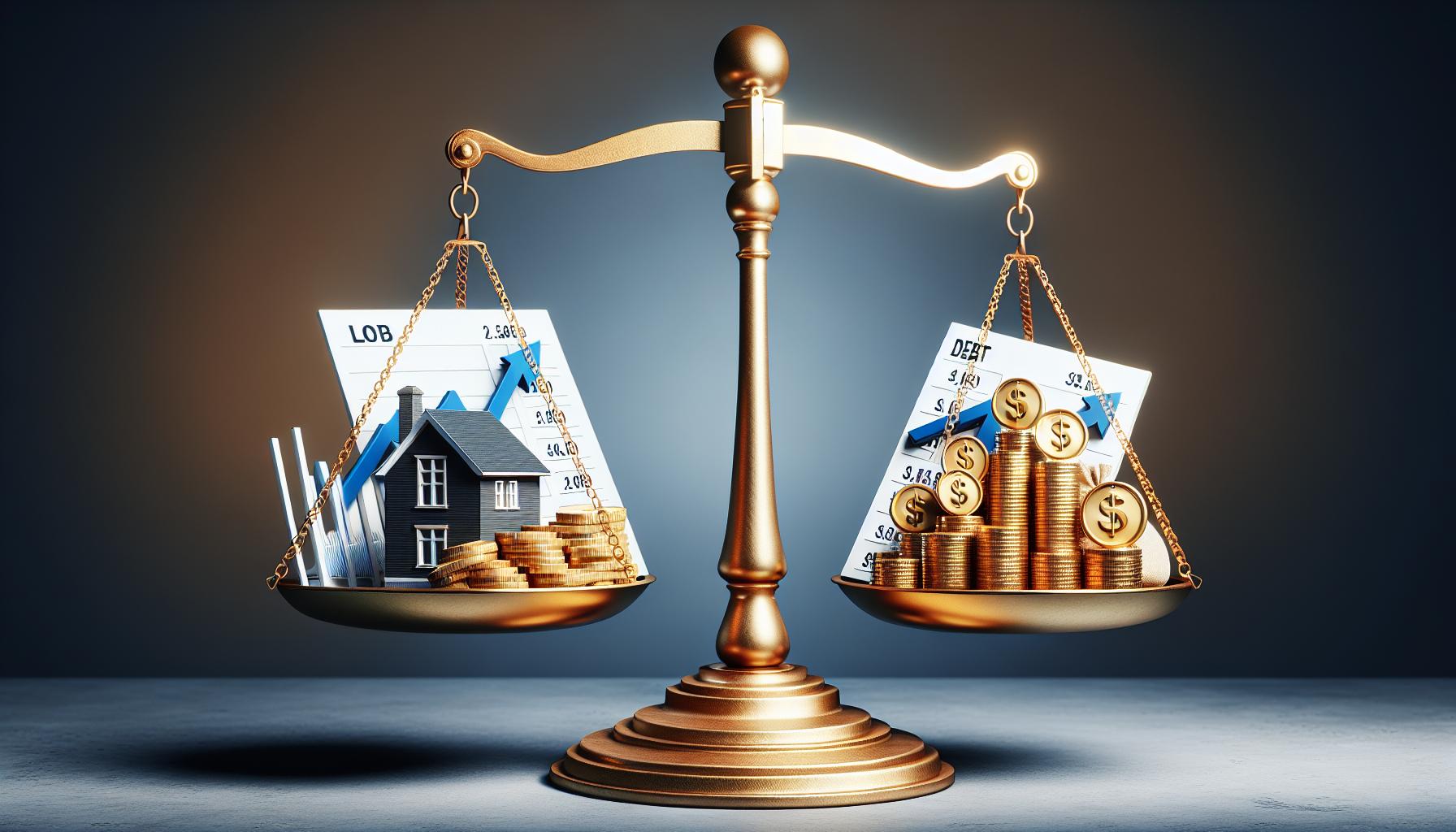Deciding Between Paying Off Your Mortgage and Investing: A Comprehensive Guide
Deciding between paying off a mortgage or investing your money is a high-stakes game. It’s a financial dilemma that many of us face. Should we channel our funds into clearing that home loan, or should we take that cash and invest it for potentially higher returns?
Truth is, there’s no one-size-fits-all answer. It’s all about your personal financial situation, risk tolerance, and long-term goals. I’ll be breaking down the pros and cons of each option, providing you with the knowledge you need to make an informed decision.
Remember, it’s not just about crunching numbers. It’s also about understanding your financial comfort zone and future aspirations. So, let’s dive in and explore the world of mortgage payoff versus investing.
Table of Contents
Pros and cons of paying off your mortgage
Before taking the plunge to hustle debt or hold on for a potential lucrative investment ride, it’s important we consider the advantages and disadvantages of paying off a mortgage early. It can sometimes be tricky to figure out the best course of action for your financial situation and life goals.
Pros of Paying Off Your Mortgage
Here are some key advantages to opting for paying off your mortgage earlier.
- Financial Freedom: Clearing your mortgage ahead of schedule can offer a remarkable sense of financial relief. This is freedom from the most substantial loan most of us will ever take. Just imagine life with no more monthly mortgage payments. It’s tempting, right?
- Risk Mitigation: Paying off a mortgage reduces your overall financial risk. It’s a guaranteed return on your investment, which is not the case with many other types of investments.
- Peace of Mind: With your house securely owned, you’ll no longer be concerned about foreclosure if sudden financial downturns come knocking.
Cons of Paying Off Your Mortgage
However, paying off your mortgage early isn’t without its drawbacks. Here’s what you need to consider:
- Limited Liquidity: Money used to pay off a mortgage becomes tied up in your property. This reduces your financial flexibility. All eggs in one basket isn’t always a wise strategy.
- Lost Opportunity for High Returns: Paying your mortgage doesn’t guarantee attractive yields in comparison to investing. You’re essentially letting go of potential higher returns from other investments.
- Lack of Tax Benefits: Mortgage interests often come with tax deductions, which you’ll miss out on once you pay off your mortgage.
So, everything boils down to your financial plan, your risk tolerance, and your peace of mind about money. Whether it’s sweeping away the mortgage dust or putting your money to work through investments, it’s all about making decisions that align with your financial goals and comfort zone.
Pros and cons of investing your money


Diving into the investment pool can be both exciting and overwhelming. It’s just like learning a new game – knowing the rules can help you play better. Let’s break down some of the advantages and disadvantages to help guide your decision-making.
Benefits of Investing
In the world of finance, investing is the king of earning potential. Typically, the more risks you’re willing to take, the higher your potential rewards could be. Here are the main pros of putting your money in investments:
- Potential for Higher Returns: Compared to the interest from a mortgage, the gains from investments can be significantly higher. For example, while the average mortgage rate may be around 3 to 4%, the average annual return of the S&P 500 over its history is close to ten percent.*
- Liquidity: Unlike with mortgages, investments can usually be sold rather quickly if you need cash. This gives you more flexibility and allows for easier access to your funds when necessary.
- Compound Interest: One of the greatest benefits of investing is the opportunity to earn compound interest. Over time, this can significantly boost your profits. I call it the ‘snowball effect’. As your investments generate returns, these returns further get reinvested and generate their own returns.
However, it’s not all rosy. Investing poses its own risks and challenges, which I’ll tackle next.
Downsides of Investing
Investing is certainly not like a free money vending machine. It requires patience, knowledge, and risk tolerance. Here are some of the commonly encountered cons:
- Risk of Loss: The biggest disadvantage of investing is that it comes with the risk of loss. Investments fluctuate in value, and there’s always a chance that you could lose part, or even all, of the money you put-in.
- Market Volatility: The markets can be unpredictable and change rapidly. The value of your investments can go up and down, and you might need a strong stomach to ride out the dips and swings.
- Requires Knowledge: To be successful in investing, you’ll need to spend time understanding the market, making educated decisions, and constantly watching your investments.
Personal financial situation and risk tolerance
In the debate of paying off a mortgage early versus investing the cash, your personal financial situation plays a crucial role. It’s essential to get a good grasp of where you stand financially before making any grand decisions. Consider these:
- Emergency Fund: You should have a liquid fund that covers three to six months of living expenses. If you don’t have this buffer, it’s wise to prioritize building it before investing or making extra mortgage payments.
- Debt: If you have high-interest debt (like credit card debt), paying it off ought to come before investing or paying down your mortgage. High-interest debt can eclipse any potential returns from investing.
- Retirement Funding: If you’re not contributing enough to get a full match from your employer’s retirement plan, it’s an area that needs focus. It’s essentially free money that can pay huge dividends in the long run.
When it comes to risk tolerance, it’s crucial to remember that all investments carry some degree of risk. High-risk investments can lead to substantial profits but dovetail with the possibility of dramatic losses. The risk level you’re comfortable with is highly personal and depends on factors like:
- Investment Knowledge: The more you know about investing, the better you can manage risk.
- Financial Cushion: A large financial cushion can allow you to absorb more risk.
Deciding whether to pay off your mortgage or invest isn’t a one-size-fits-all answer. It’s a decision that requires careful examination of your current financial situation, future financial goals, and comfort with risk. Thinking it through will make the decision less of a guessing game and more of a sound, future-building strategy. Let’s explore these considerations in further depth next.
Long-term goals and aspirations
Once we’ve assessed our risk tolerance, we should delve deeper and explore the role of our future plans in this mortgage vs. investment dilemma. Of course, each of us has unique long-term goals and aspirations. Whether it’s cruising around the world on a luxurious yacht, putting our grandkids through college, or living a modest, peaceful life post-retirement, our dreams significantly impact our financial maneuvers.
If securing homestead and achieving a debt-free status is your long-term goal, paying off the mortgage early might be the financially sound move. Imagine the peace of mind that a fully paid residence can bring. Life without monthly dues is a dream many of us have, and taking steps towards it can bring solace and financial security.
On the other hand, if wealth accumulation or ensuring a financially stable future for our loved ones is what we are after, investing the cash might seem like the more appealing route. This isn’t all about instant gratification or material gains but deeply rooted in our desire for long-lasting financial health. By investing wisely, we may see our money working for us, growing year after year and allowing us to support those causes that speak to our hearts.
Such decisions aren’t light ones. They’re influenced by factors like age, income, family needs, and even personal temperament. Age plays a crucial role here – the younger we are, the more time we have to recover from possible investment losses. With a higher-income bracket, we might bear higher risks, while a family person may lean towards safety nets rather than high-risk endeavors.
Let’s not forget, our economic condition fluctuates over time. While an investment may bring in lucrative returns now, the tables can turn and we may experience lackluster performance in a volatile market. On the other hand, paying off a mortgage provides the assurance of a steady, open income stream once cleared.
Remember, it’s important to wear your thinking cap, pick your brain, and get professional aid when required.
Making an informed decision


Now that we’ve identified goals, personal circumstances, and economic conditions as key factors in the decision to pay off a mortgage early or invest, let’s dive deeper. In this journey, remember – our main objective is to make a decision that complements our long-term financial health and security.
Understanding one’s personal financial temperament plays a crucial role. It’s about the level of risk we are ready and able to take. For instance, the stock market might promise higher returns than the interest saved by paying off your mortgage but it’s fluctuating nature also brings a level of unpredictability. Are you comfortable with this?
In contrast, early mortgage payoff offers stability and certainty, but potentially lower long-term returns. To illustrate, think of it like deciding between a wild, high-speed roller coaster and a calm, slow-moving carousel. Both provide enjoyment but in very different ways.
Then, we have the aspect of age and income. These can greatly influence the decision-making process. For example, younger folks with a high, stable income might lean more toward investing, as they can potentially handle more financial risk and have plenty of working years ahead. If we illustrate this through a markdown table:
| Age & Income Factors | Early Mortgage Payoff | Investing |
|---|---|---|
| Young & High Income | Low Preference | High Preference |
| Old & Low Income | High Preference | Low Preference |
Lastly, taking professional advice can be valuable. Financial advisors can provide personalized guidance based on your unique situation, which may include crunching numbers for potential scenarios, advising on current market conditions, or helping you visualize your financial future with different strategies.
In short, while you’re plotting the path towards your financial goals whether that be wealth accumulation or securing a debt-free status, remember that there’s no one-size-fits-all answer. It’s about understanding your personal circumstances, being aware of your risk tolerance level, and making an informed decision that will benefit you in the long run.
Conclusion
So, it’s clear that there’s no one-size-fits-all answer to the pay off mortgage vs. invest debate. It’s all about understanding your financial situation and risk tolerance. Age and income play key roles too. Don’t forget, getting professional advice can be invaluable. It’s all about making an informed choice that aligns with your long-term financial goals. Remember, whether you decide to pay off your mortgage early or invest, it’s crucial to make a decision that’s right for you.
Frequently Asked Questions
What is the main point of the article?
The article stresses the importance of making an informed decision between paying off a mortgage early or investing. It factors in elements such as personal financial temperament, risk tolerance, age, income and the need for professional advice.
Does the article suggest one option over the other?
No, the article does not favor either paying off a mortgage early or investing. Instead, it emphasizes on understanding personal circumstances, risk tolerance, and long-term financial goals when making such decision.
Does personal financial temperament affect these decisions?
Yes, your personal financial temperament and risk tolerance can greatly influence whether you choose to pay off your mortgage early or invest.
How does age and income influence this decision?
Age and income levels have a substantial role in this decision-making process. Generally, older individuals or those with a higher income may have more flexibility than younger individuals or those with lower income.
Should I seek professional advice?
The article suggests seeking professional advice to receive personalized guidance based on individual circumstances. While it’s not a necessity, it can provide further clarity and confidence in your decision.





